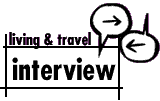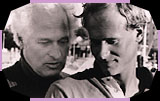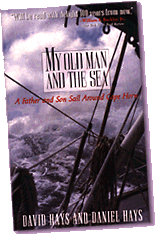

Daniel Hays
interviewed by Mike Agger on July 15, 1996

"Life at sea has a wonderful focus. Your actions matter because your job is to keep the ship afloat and yourself alive. This requires putting all your personal mental junk aside and concentrating on the task at hand."
Daniel Hays and his father David Hays are the first Americans to sail around Cape Horn in a boat under thirty feet in length. Their book, "My Old Man and the Sea," tells the story of the voyage. It is part family history, part travelogue, and a powerful testament to the rhythm and beauty of life at sea. Daniel now works as a field supervisor at a therapeutic wilderness program for troubled teenagers in Idaho.
Tripod: How does life on land compare to life at sea?
Daniel Hays: Life at sea has a wonderful focus. Your actions matter because your job is to keep the ship afloat and yourself alive. This requires putting all your personal mental junk aside and concentrating on the task at hand. There is a great quote about the sailing life from Joseph Conrad's "The Secret Sharer" that I always remember:
-
Suddenly, I rejoiced in the great security of the sea as compared with the unrest of the land, in my choice of that untempted life, presenting no disquieting problems, invested in elementary moral beauty by the absolute straightforwardness of its appeal, and by the singleness of its purpose.
Tripod: Of the 317 days you spent on your boat, is there any day that stands out in your memory more than the others?
DH: At one point in the trip, I spent forty-two days by myself, which is a long time. I was feeling disconnected from things, alone. Around the thirtieth day, I was in the Doldrums off the coast of Brazil. The weather and the sea were perfectly calm. Putting on my mask, snorkel, and fins, I swam down as far as I could, maybe thirty or forty feet underwater. I hung there motionless and looked back up in the boat.
At that moment, I could feel where the water touched my body and went into my cells. In my mind, I traveled to the shoreline, up rivers, up smaller streams, up sewage pipes, and even peaking out at a friend through a water spout in her sink. It was a neat feeling of connectedness. If you look at a globe, the earth is mostly water. When you are forty feet under in the Atlantic, you are touching all the water in the world. I felt I had become part of the planet.
Tripod: How did you live with yourself for forty-two days?
DH: Well, I slept a huge amount, twelve to fourteen hours a day. The sleep was in short spans because I had to wake up to check the boat. I also had my little routine: drinking strong coffee around sunset, writing for a couple of hours, read, sleep, do navigation, do chores. It felt very nice.
Tripod: What books did you read?
DH: During that forty-two days, I would read anything to keep my brain occupied. I must have read twenty Roger Zelazny science fiction books. My whole mood would become a book, since there was so little external input otherwise. I stopped reading the Brothers Karamazov because it was too murky. Before the trip, someone had given me Stephen King's "Pet Semetary." Reading it, I got so scared I threw the book overboard. Of course, the whole premise of the book is that things which die will come back to life. I was sure that the book was going to come back on the boat. I would look at my cat and scream.
Tripod: You had friends on the boat at several times during the trip. How did this compare with being alone?
DH: It was hell. I drove people away like crazy on the trip. It was a lot easier for me to be alone.
Tripod: How about when your Dad joined you to sail around Cape Horn?
DH: It was easier to be with my Dad, but also harder because I felt that having him around was a shadow over me. It seemed that any decision I made was subject to his opinion. This ties into my feelings about death. The most important day in your life is when your dad dies because suddenly you are suddenly the one making the decisions about your life. You may have been making your own decisions before that, but there is always that little loop in your mind: "What would my Dad think of this?"
We were on the boat in close quarters together for a long time. It was kind of like being married. You spend so much time with a person that you establish an intimacy with them and lack of defensiveness. We also picked on each other in the ways that people do.

Tripod: Your fear of your dad dying is a major theme of the book.
DH: Dad was my hero when growing up, he could do everything better than I. When I was twenty-five and he was fifty-five, I began to overtake him physically. My mind was also sharp. He would be forgetful on the boat, and it was hard for me to begin to notice these things. I wanted him to be better and more perfect at everything. At that time, I couldn't focus on those qualities where he excelled, like his wisdom. It was good to face the whole thing, the fear of my dad dying.
Tripod: Was the trip about running away from responsibility, or was it about returning to "real life" with a fresh perspective?
DH: It was definitely about running away and that is still the thing I do best. At the time of the trip, I was just finishing college, and there was a lot to run away from. Also, I was tired and bored and things were in a rut for me. Think of a little kid trying to get out of a room. He sees the doorknob and it might take him days to first figure out how that doorknob works. When he does find out, he never pays attention to another door. When was the last time you contemplated a door in the way that a little kid does? Ideally, I want all of my life to be brand new. The voyage brought some of that freshness back.
Tripod: What did you ultimately take away from your voyage?
DH: People ask me that often, and I sense that they want to hear some great pronouncement like, "Well, I am never scared of anything anymore." It's not like that. It was like biting into an apple; the voyage became a part of me. I do not know specifically what I got from it. It is just another page in the way I live my life.
DH: I suppose a lot of people go into therapy for it because they are neurotic. My life now is surrounded by things I don't understand, but I keep a very organized little space of things that I know well. My job, working with crazy teenagers, is something that I understand and find meaningful. I've always done what I wanted to do for a living. I do not have a bumper sticker that says "I'd rather be doing something else." If I wanted to do something else, I would be doing it, and finding a way to make money at the same time.
With certain people, I notice a lot of resentment when I talk about my trip. They are desperate to explain why I can sail around Cape Horn and they can't. They say, "Oh, you have money." Money is their favorite thing to use to keep them in the role of victim. I hate that. My life is my life and I am a verb in it. It's not about having money, it is about having the courage to do these things.
Tripod: What holds people back?
DH:The same thing we all have inside us, fear. Fear of rejection, fear of failure. It is a lot safer to have your reasons than to fall on your face. The problem is one day you're dead and it says on your tombstone, "Everything was safe." Sailing around the world is not everyone's risk. It could be being in a relationship, or telling your mother the truth about something. People are confined by the things because they say so. They do not want to be powerful. They make up stories to limit themselves.
Tripod: The first half of the book describes the Horn as the most feared stretch of water in the ocean, but the expected catastrophe never really happens. I found this refreshing. Although you wanted to be physically tested, the Horn was really a spiritual goal.
DH: That's right. Just like you cannot conquer fear, you cannot conquer nature. There is one book called "Two Against Cape Horn," and guess what happens? They get shipwrecked. Duh!
Tripod: How is life in Idaho? You are a long way from the sea.
DH: There is a wonderful immediacy to life out here, not unlike being at sea. The other day, driving near my home, I saw a deer lying along the side of the road. It was badly injured, panting, in complete misery. I went to the back seat of my car, pulled out a gun and shot it. That is the kind of deliberateness that I like out here. To make a sweeping generalization, my life in the East always seemed very removed, very secondhand.
Tripod: What's next? Do you plan to remain landed for awhile?
DH: Well, yesterday I signed a mortgage on a house. I got so nervous that I went out and bought a gun. I shot at things all over the yard. This is how I handle stress in Idaho. For me, the fact of having a house and a girlfriend is much more terrifying than rounding Cape Horn.
"My Old Man and the Sea" was recently published in paperback.
